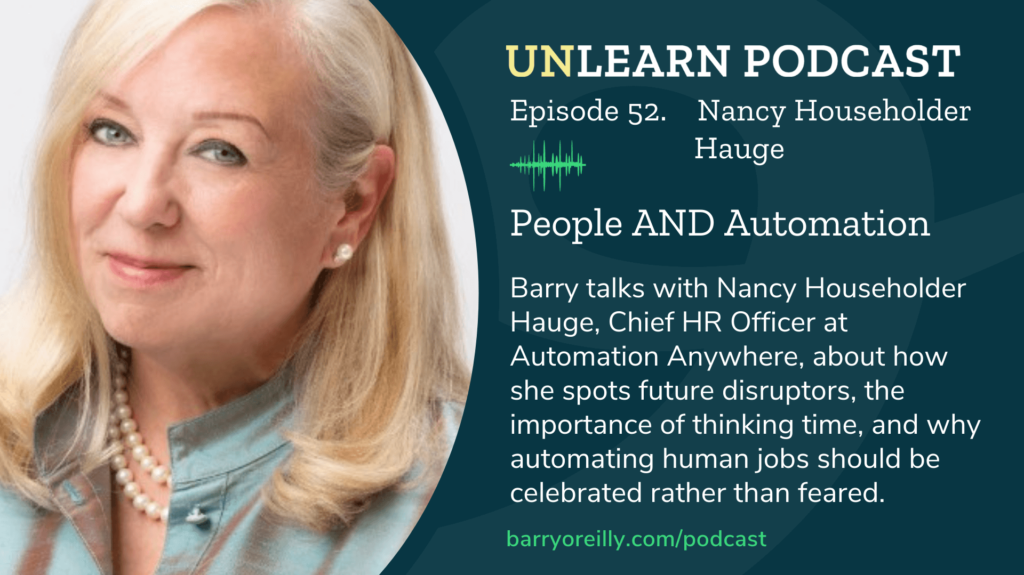Nancy Householder Hauge is the Chief HR Officer at Automation Anywhere, one of the fastest-growing companies in the world. She sees herself as Chief People Officer because she believes in putting people first even in the midst of disruption. Nancy has won the Stevie Award for women in hi-tech and is considered one of the most influential women in Silicon Valley.
Barry O’Reilly admires her talent for spotting winners and her sense of humor. Nancy has coached future female leaders and truly understands the challenges that organizations face when they are transforming. She joins Barry to talk about how she spots future disruptors, the importance of thinking time, and why automating human jobs should be celebrated rather than feared.
Spotting Future Disruptors
Nancy credits her time at Sun Microsystems with giving her an appetite for companies that disrupt. She believes that getting ready for the future means unlearning the past and being open to something new and different. Three things get her intuition buzzing that a company may be a future disruptor, she says:
- The people are smart;
- They are good, as people, and at their mission;
- They are passionate about what they can achieve.
She tells Barry that she joined Automation Anywhere because the CEO asked her a provocative question that made her want to help solve it. Barry comments, “People that are smart and passionate and deeply ingrained in something new seem to be able to ask those provocative questions; and great teams are good at asking those provocative questions of one another… to actually tease out some of the real meaning, the real value, the real things that matter to folks.” [Listen from 2:50]

Automation is Good
Automating repetitive manual tasks frees humans up to do the work our brain was made to do. It uncovers talents in us that we couldn’t explore because we were bogged down with “arcane processes and mundane work”. “The really wonderful discovery I’ve had around bots,” Nancy tells Barry: “One is I’ve never met anybody who wants to go back to manual after they’ve automated something. And the second thing is we’ve never built a bot… that didn’t promote a human being. In other words, they got to do something more interesting.” Because Automation Anywhere robotized many repetitive tasks, they were able to use the data generated to create individual development plans for their employees, which helps ensure each employee is getting what they need to thrive. This is something that could not have been developed without automation, Nancy proudly emphasizes. Barry comments, “…bots are here to unleash people to do highly complex, creative work and take away the menial tasks that are holding them back from blooming…” “Automation has given me access to my ‘if only’ list,” Nancy continues. [Listen from 9:40]
Disrupting the Concepts of the Workplace
The pandemic has completely disrupted the notion of the workplace: with the ubiquity of remote work, we’re now getting a more intimate look at each other as humans rather than employees and workmates. “I will never see these people just under that definition of employee again,” Nancy remarks. “They are the human beings that make this up.” Barry agrees that it has been the breakthrough unlearning over the last year. He says it lets people be more of themselves. “I think the biggest thing we had to unlearn in the last year [is] we had to unlearn distrust,” Nancy comments. Leaders now have to lead with trust; they have to accept that their employees are committed to their work and don’t have to be in the traditional workplace to fulfill their obligations. Trusting also means measuring the quality of the work, not the activity performed to create it, Barry adds. We have to rethink how we assess who is making a contribution, and realize that contributions can come from anyone anywhere in the organization, Nancy posits. [Listen from 16:25]
Freedom to Think
Thinking is real work, and we need to intentionally schedule time for it. Nancy shares a story about her CEO to illustrate that leaders should model the importance of making time to think. It’s about freeing yourself up to focus on more important things, Barry says. Nancy tells the female leaders she coaches to recognize when they are most creative and make certain to get that time every day. Don’t leave it up to chance, she advises them. [Listen from 25:10]
Looking Ahead
Nancy believes that the workplace of the future will be more of a collaborative space than a corporate office. As such, they will be configured to reflect collaboration rather than hierarchy. It’s going to be a more level playing field, and more ideas and innovation will emerge from this. The disruptive leaders are usually the people who are not tied to doing things traditionally, Nancy says. While they respect the wisdom of the traditional systems, they are not emotionally invested in them and can see from a different perspective. “It is generally the people who don’t have the most experience who lead us most courageously into the future,” Nancy remarks. [Listen from 32:55]
Don’t want to miss a post? Sign up for my podcast newsletter and monthly newsletter!















